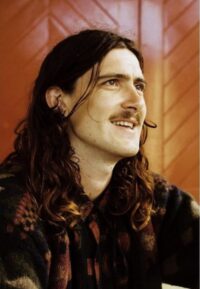Wesley John Fourie

Wesley, 2021
Photograph by Benji Hartfield
Wesley John Fourie (they, their) has spent the last six years developing a practice that moves between drawing, sculpture and textile arts (knitting, embroidery, appliqué, etc.). As part of their research, they undertook three residencies in Southeast Asia, at Preet Nagar (Punjab, India) AZIMVTH ASHRAM (Haridwar, India), and Bikalpa Art Center (Katmandu, Nepal). Among their many “day” jobs, their favourites include working for Hospice Shops in Dunedin and Whanganui (a great source of found material) and for the Fiordland National Park on the South Island’s West Coast (inspirational landscapes).
Seizing every opportunity to exhibit that presented itself in the last three years, they have begun to receive national attention: In 2020, their textile installation “Aoraki,” 2019/2020, which explores society’s responses to nature, was included in the 2020/2021 Wallace Art Awards travelling exhibition. In 2021, they won the MMC Youth Award for “Poems for Ephemeral Men,” which drew upon queer culture and the sentimental traditions of 19th c needlework, challenging cultural assumptions about both.
Don Abbott, in Art New Zealand (Autumn 2021), observes, “Fourie could restore a cynic’s faith in the power of love, yet hints at more than a hatful of heartbreak.” They spent the 2020 lockdown creating and “the fruits of” their “labours are sewn into a sheet from real life….It features poetry, proclamations, lyrics and repeated interjections, the words in cotton and silk, fashioned like the slo-mo scrawl of an impassioned graffiti artist.”
“Poems for Ephemeral Men” represents a significant strand of their output that explores relationships and intimacy in a marked autobiographical mode. They use the techniques of traditional needlework, incorporating what might be called occasional vernacular poetry in the tradition of the American Beat Poets of the 1940s and 1950s, and those that followed them in the 1960s and after, including the so called “rock-poets,” such as Leonard Cohen and Patti Smith.
“Aoraki,” emerges out of another equally significant strand in Fourie’s project that concerns itself with nature and spirituality. In Fourie’s words: “This work invites the viewer to take themselves away, if only for a moment, to a quiet place, at the base of a sacred mountain, somewhere in their mind.” These two strands are not, however, distinct in that Fourie’s explorations of human relationships are inextricably linked to their relations with nature. Thus, they titled a November 2020 exhibition “my body as rainforest.” Similarly, their exhibition “in the centre of love with you” includes “a 6m long embroidery detailing over 100 NZ native plant species, “Forest Floor (where we lay together in love).” Also included are three hand-stitched blankets that featured “poetry that [they] have written, song lyrics and text messages, all sent/said to various boyfriends in [their] life.”
References
Wesley John Fourie, artist website, https://www.wesleyjohnfourie.com/ .
Don Abbott, “Molly Morpeth Canaday Award,” Art New Zealand 177 (Autumn 2021), p. 47.
Wesley John Fourie, “Into the centre of love with you,” 15 September 2020, St. Petersburg Art Residency Virtual Studio, Online, consulted 7 December 2021.
Wesley John Fourie, “Aoraki, 2019-2020,” 24 July 2020, St. Petersburg Art Residency Virtual Studio, Online, consulted 7 December 2021.
CATALOGUES
PUBLICATIONS
2022 Essays by Bridie Lonie and Alistair Fox
2022 Artists’ Kōreo with Wesley John Fourie, Felix Harris and Taarn Scott
2023 “Wesley John Fourie and Ngā Roma Poa: Green-screened,” essay by Hilary Radner